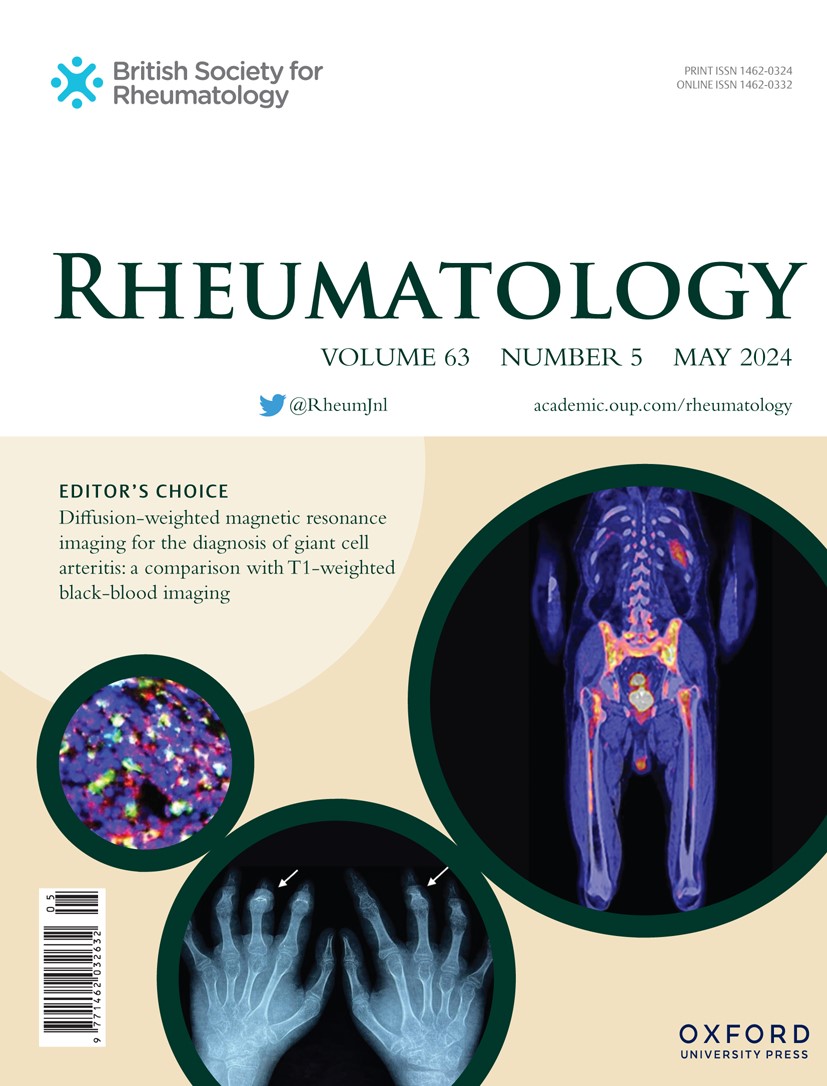TNF抑制剂对强直性脊柱炎患者癌症复发风险的影响:一项巢式病例对照研究
IF 4.7
2区 医学
Q1 RHEUMATOLOGY
引用次数: 0
摘要
目的探讨肿瘤坏死因子抑制剂(TNFi)对有癌症病史的强直性脊柱炎(AS)患者癌症复发风险的影响。方法采用来自全国数据库的队列进行巢式病例对照研究。该队列由AS患者和诊断后有癌症史的患者组成。我们以1:1的比例确定癌症复发病例和选择对照,年龄、性别、指标癌症诊断日期和随访时间相匹配。采用多变量条件logistic回归分析评估TNFi暴露对癌症复发风险的影响。结果共有2574名AS患者和有癌症病史的患者被纳入该队列。其中394例(15.3%)患者复发。肿瘤复发率为4.87(95%可信区间[CI] 4.40 ~ 5.34)/100人年。从该队列中,254例病例以及年龄、性别、索引日期和随访时间匹配的254例对照纳入巢式病例对照研究。暴露于TNFi的患者比例在病例和对照组之间没有差异(24.8% vs. 24.4%, p = 0.918)。在多变量条件logistic回归分析中,TNFi暴露与癌症复发风险增加无关(校正优势比1.157,95% CI 0.734-1.825, p = 0.531)。结论:在AS患者中,TNFi暴露与癌症复发风险增加无关。我们的研究结果表明,对于患有AS和有癌症病史的患者,TNFi可能要谨慎使用。本文章由计算机程序翻译,如有差异,请以英文原文为准。
Effect of TNF inhibitors on the risk of cancer recurrence in patients with ankylosing spondylitis: a nested case-control study
Objective To investigate the effect of tumour necrosis factor inhibitors (TNFi) on the risk of cancer recurrence in patients with ankylosing spondylitis (AS) and a history of cancer. Methods We conducted a nested case-control study using a cohort derived from a nationwide database. The cohort consisted of patients with AS and a history of cancer after AS diagnosis. We determined cases of cancer recurrence and selected controls at a ratio of 1:1, matched for age, sex, date of index cancer diagnosis, and follow-up time. Multivariable conditional logistic regression analysis was used to assess the effect of TNFi exposure on the risk of cancer recurrence. Results A total of 2,574 patients with AS and a history of cancer were included in the cohort. Among these, cancer recurred in 394 (15.3%) patients. The incidence rate of cancer recurrence was 4.87 (95% confidence interval [CI] 4.40–5.34)/100 person-years. From this cohort, 254 cases and age-, sex-, index date-, and follow-up time-matched 254 controls were included for the nested case-control study. The proportion of patients exposed to TNFi did not differ between the cases and controls (24.8% vs. 24.4%, p = 0.918). In the multivariable conditional logistic regression analysis, TNFi exposure was not associated with an increased risk of cancer recurrence (adjusted odds ratio 1.157, 95% CI 0.734–1.825, p = 0.531). Conclusion TNFi exposure was not associated with an increased risk of cancer recurrence in patients with AS. Our findings suggest that TNFi may be used with caution in patients with AS and a history of cancer.
求助全文
通过发布文献求助,成功后即可免费获取论文全文。
去求助
来源期刊

Rheumatology
医学-风湿病学
CiteScore
9.40
自引率
7.30%
发文量
1091
审稿时长
2 months
期刊介绍:
Rheumatology strives to support research and discovery by publishing the highest quality original scientific papers with a focus on basic, clinical and translational research. The journal’s subject areas cover a wide range of paediatric and adult rheumatological conditions from an international perspective. It is an official journal of the British Society for Rheumatology, published by Oxford University Press.
Rheumatology publishes original articles, reviews, editorials, guidelines, concise reports, meta-analyses, original case reports, clinical vignettes, letters and matters arising from published material. The journal takes pride in serving the global rheumatology community, with a focus on high societal impact in the form of podcasts, videos and extended social media presence, and utilizing metrics such as Altmetric. Keep up to date by following the journal on Twitter @RheumJnl.
 求助内容:
求助内容: 应助结果提醒方式:
应助结果提醒方式:


